#ute mountain ute tribe
Text



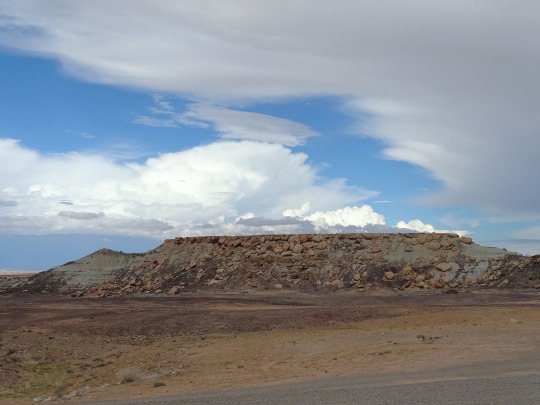
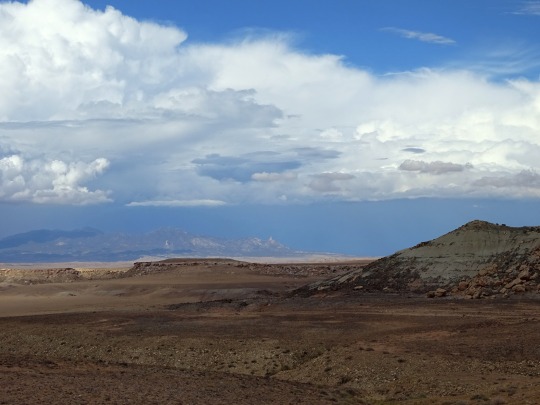
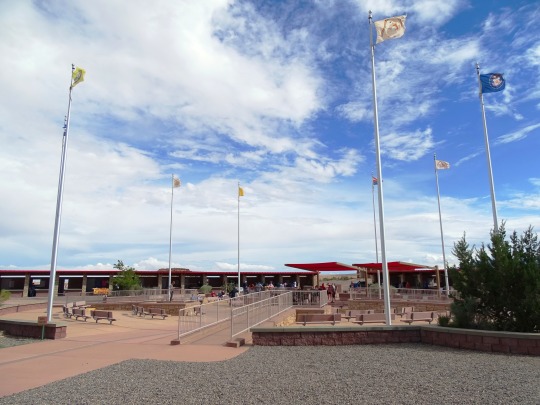
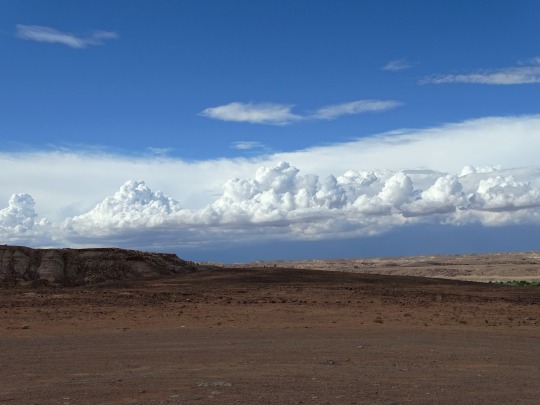
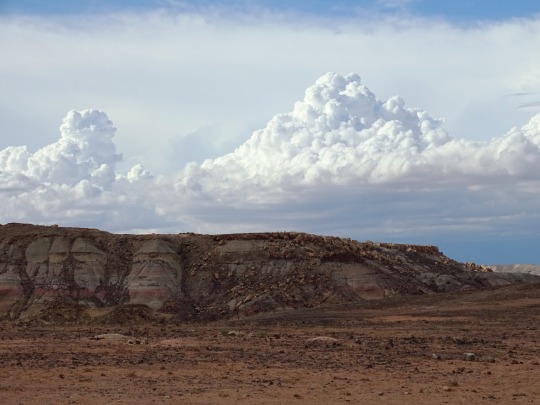
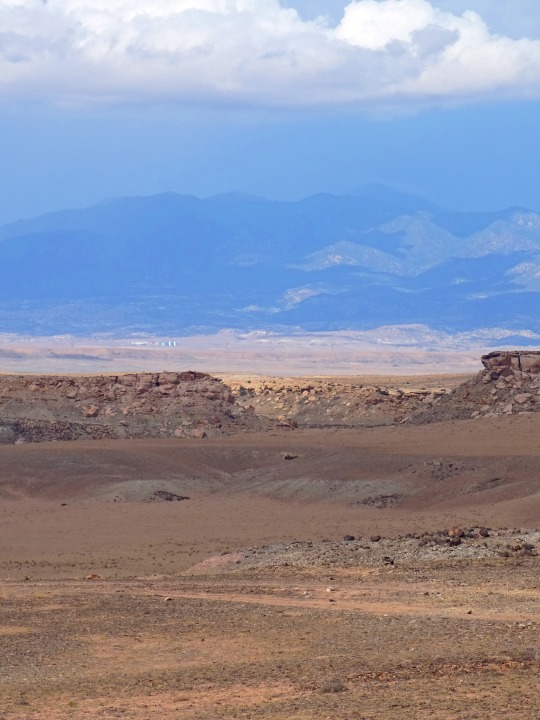

Clouds (No. 1024)
Four Corners Monument
#Four Corners Monument#Arizona#New Mexico#Colorado#Utah#summer 2022#desert#blue sky#clouds#flagpole#Colorado Plateau#Navajo Nation#Ute Mountain Ute Tribe#travel#original photography#vacation#tourist attraction#landmark#landscape#architecture#countryside#nature#USA
1 note
·
View note
Text
"Colorado is poised to be the first state to to expand automatic voter registration to Native American reservations, thanks to a new registration system.
Tribal members have the right to vote in elections, from the local to the national level, just like other U.S. citizens. But actually casting a ballot has been an uphill battle for many tribal residents, including those here in Colorado. Even after obtaining official U.S. citizenship a century ago, Native Americans’ ability to vote has been consistently ignored or actively undermined. In recent decades, unequal access to in-person voting, early voting and election funding on tribal lands has been a particular issue...
Working with Colorado tribes, state lawmakers passed a set of election reforms earlier this year to expand voting access for Native Americans. Those reforms include the nation’s first automatic voter registration program of its kind for Native Americans. The program will cover both of the federally-recognized Native American reservations in the state—the Southern Ute Indian Tribe and the Ute Mountain Ute Tribe, and will allow the tribes’ governments to submit lists of members to be registered through the Secretary of State Jena Griswold’s office.
Griswold said the new registration system could make a big difference for Colorado's tribal communities.
"Seeing registration rates and turnout rates being much, much lower on tribal lands is a big problem that we want to solve,” Griswold said. “I personally believe automatic voter registration is one of the best ways to register voters in the state of Colorado, and all of our data shows how highly effective it is.”
Colorado is one of more than two dozen states that have automatic voter registration systems, but Colorado is the only state so far to extend its system to cover Native American reservations. When Colorado rolled out its system for the first time in 2020, about 250,000 people were added to the state’s voter rolls within the first year.
Now, [Secretary of State] Griswold hopes the new registration program will have a similar effect on tribal lands in the state. She wants to see the program in place in time for the 2024 election. For now, tribal leadership is reviewing the plan and providing feedback on it.
“It will not take us much time to register people once we start receiving data,” Griswold told KUNC. “But I think there's a couple of logistics to still work through.”
Measures to keep tribal members' information confidential were added recently at the request of the Southern Ute tribe, and lawmakers have also increased the number of on-reservation vote centers available for early voting and on Election Day.
This year’s election reforms also build on a slew of changes in recent years. For example, in 2019 Colorado lawmakers guaranteed in-person voting centers on tribal lands and loosened address requirements for voters."
-via GoodGoodGood, December 15, 2023
#colorado#native american#indigenous#first nations#indigenous rights#native american rights#united states#us politics#automatic voter registration#voter registration#election 2024#2024 election#voting access#democrats#voting matters#voting#voting rights#ute#good news#hope
2K notes
·
View notes
Text
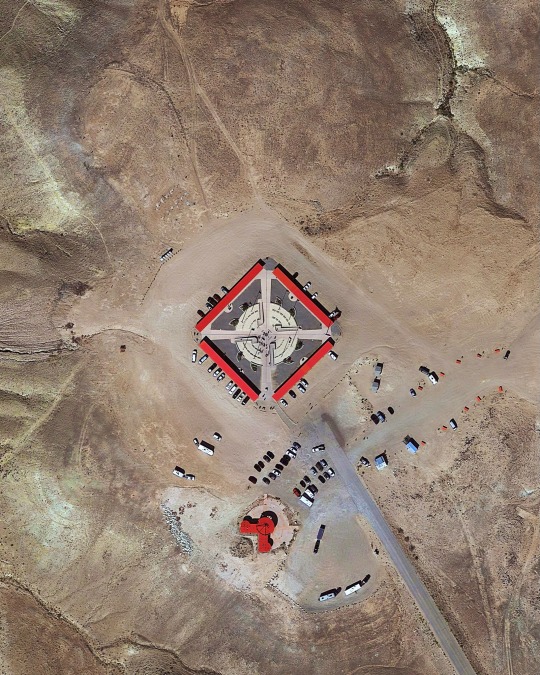
Four Corners Monument marks the quadripoint in the Southwestern United States where the states of Arizona, Colorado, New Mexico, and Utah meet. It is the only point in the United States shared by four states, and it also marks the boundary between two semi-autonomous Native American governments: the Navajo Nations and the Ute Mountain Ute Tribe. Visitors to the monument can position themselves at its center and “stand in four states at once.”
36.998977°, -109.045172°
Source imagery: Maxar
284 notes
·
View notes
Text
All That Glitters: Prologue

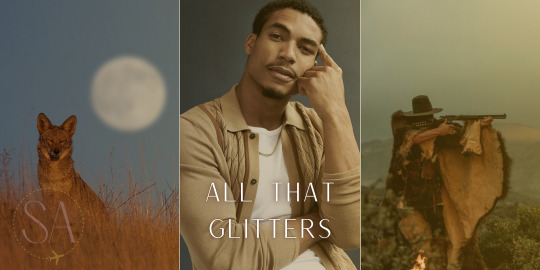


All That Glitters: Prologue
Pairing: Javy "Coyote” Machado x Reader
Summary: Growing up in the untamed wilds of the west afforded you many opportunities that most women weren't allowed, namely that of choice and self sufficiency. One day, your father announces his intention to marry you off, and you take your chance to escape, moving south to try your luck at striking gold. You arrive in the town of Maverick, setting up shop, but soon learn that life on your own is tougher than you previously thought. You catch the eye of a handsome man, but you're determined to rely on your own skills. Only, you may end up needing his help after all...
Trigger Warnings: References to living in the wild, Mentions of Indigenous tribes, Use of Y/N, Allusions to daddy issues, Poverty living, Sexism, Forced engagement, running away, Talks of gold. I think that's everything, but please let me know if I missed anything!
Word Count: 1.36k
Masterlist || DPU Masterlist

The mountains of the west are where you called home, and you knew every tree and stone like they were old friends. Or at least, that’s what it felt like to you.
The Rocky Mountains had sheltered you in their bosom from as early as you could remember, the old trees hiding you away from the rest of the world as your father worked, trapping and skinning the different animals that roamed this part of the world. He was an older man, getting well on in years, and you had no doubt he would pass on his trade to you any year now. You practically helped him run the business as it stood, a fact that you were very proud and mindful of.
It had just been you and your father for almost two decades now, your mother having taken ill when you were still young. The shadows of a kind smile and comforting song still teased the edges of your memories, but it had been so long, that you couldn’t be sure if they were real or the manifestations of hope teasing you with ideas of what it was to have a mother. You had been told by all who knew her that you were her spitting image, and to those comments you were never sure how to respond, so you didn’t.
You and your father lived in a remote cabin in what felt like the densest part of the forest. While he went out checking his many traps for new boon, you were stuck at home tending to the chores around your little fortress. Not many people came by your way, but those who did already knew where to look. Your father had friendships among the local Ute tribes, often trading with them for needed supplies. You had made tentative friendships over the course of the years, knowing that it would come in handy one day.
Now that you were older, you were trusted with more, and you prided yourself on keeping a neat home despite the surrounding wilderness. You were hanging the laundry up to dry when the sound of a horse trotting through the thicket caught your attention. Your body stiffened, ready for a potential threat, but you relaxed as you recognized the rider.
“Duncan,” you greeted easily, continuing your task. Duncan was a tall, strong man of about thirty years with strawberry blond hair, earth brown eyes, and sun-kissed skin. The scruff on his face indicated that it had been a few days since he had last shaved, and you weren’t sure if you like it.
“Y/n!” He called with a grin, his horse, Boone, barely coming to a stop at the foot of the small hill before he was dismounting. You supposed he was a handsome man, but you had known him since you were young, your fathers working together in the trade before Duncan’s father took ill some six years back. Duncan had already been well into adulthood by that time, promptly picking up the mantle his father had left behind.
Deep down, you knew your father had wished you were his son rather than his daughter, but you worked tirelessly to prove to him that you were just as capable as any son. You supposed it also helped that Duncan was a near constant figure in both your lives.
“Is your father around?” He asked, looking past you towards the cabin. You pinned the last sheet to the line before picking up the basket and holding it at your hip.
“He should be back soon,” you told him. “Why don’t you come wait inside?”

The rest of the day passed quickly, your father making his appearance just before the sun set below the horizon. You served dinner, listening quietly as your father and Duncan discussed business around the fire. You cleaned quietly, excusing yourself to your bed. The cabin was a one room building, the little privacy you were afforded was hidden behind a makeshift curtain in the far corner. You changed into your night shift, moving to slide into bed when you heard your father utter your name. You paused, glancing at the curtain that separated you from the two men. Padding to the edge quietly, you peeked through the crack between the fabric and the wall. The two chairs were silhouetted against he warm, orange glow of the fire, but you could still see the smoke rise from your father’s pipe.
“I’m getting older. You know that, Duncan,” your father sighed, relaxing further back into his chair. His accent was thick with the weariness of the day, and there were days where even you struggled to understand him.
“Yes René,” Duncan chuckled. “I’m aware.”
“My girl is smart, strong, capable,” your father continued, and your heart swelled with pride at his words, your chest puffing up a little. “But she can’t be on her own when I’m gone.”
You frowned at that, brow furrowed in confusion. What did he mean by that? Had you not proven to him time and time again that you were able to take care of not only yourself but him? You were so caught off guard that you nearly missed his next words.
“She’s too dependent on me,” he murmured, frown evident in his voice. “She needs a man to keep her safe and grounded.”
“What are you getting at André?” Duncan asked carefully, leaning forward onto his knees as he stared at your father.
“Take her for your wife, Duncan.”
Your heart stopped.
“She’s agreeable and a hard worker,” your father continued, a cough wracking through him. “And I’m sure it has not escaped your attention that she’s quite the beauty as well.”
“It hasn’t,” Duncan hummed. “It’s true, she would make a most agreeable wife, but I don’t know.”
“Duncan,” your father chided. “You are the son I never had. Why not make it official? It would do this old man’s heart good to know that my daughter is in the care of someone who will take care of her.”
There was a long pause between the two.
“Alright, André,” Duncan relented. “I accept.”
You watched as the two men shook hands, bile rising up in your throat. You slunk back into your bed, waiting for their conversation to die down and silently making plans of your own.

It had taken you all of one day to find your opening to escape, a singular, small pack holding a change of clothes and your mother’s journal. Duncan had left your home with the promise to return the following week, your father having gone out not too long after. You had left him a note, telling him that you had left and that you wouldn’t be back. There was no point in beating around the bush. The two of you weren’t flowery people. It took you all of two days to make it to Denver, trading a couple of furs for a few nights at the local tavern. You hoped you’d be able to come up with a plan before your stay was up.
“You heard the news?”
You glanced over to the table to your right where two men sat, drinking beer and playing a game of cards.
“What news?” The man with the beard asked in a grunt, throwing down a couple of chips. His friend threw down the same amount, drawing a card to add to his hand.
“Heard they found gold northwest of Santa Fe,” the first man said, scratching at his whiskerless chin. “A little town called Maverick. Sounds like they’re opening a mine and everything.”
“Maverick,” the bearded man drawled, “ain’t that the town with the upstarts?”
“The Dagger Posse, yeah,” the man said. “Anyway, the mayor apparently announced that they’re handing out permits or whatever for mining and panning. Could be worthwhile.”
His companion grunted, revealing his cards as the man groaned. Pulling the pile of chips closer to him, he sniffed.
“Might not be a bad idea to get a move on now before more people showed up.”
You didn’t hear the rest of their conversation, already heading back to your room to make plans for tomorrow.

A/N: And here it is! The start of Javy's spinoff! The plan is to work on my entry for the Galentine's day challenge and then I'll let you guys decide who we hear from next! As always, reblogs and comments are greatly appreciated! Be sure to follow my side account: @sailoraviator-library and turn on post notifications if you'd like to be notified of when I post! You can also follow me on AO3 under the username sailor_aviator. Thanks for reading!
#javy coyote machado#javy coyote machado x reader#javy coyote machado x you#javy coyote machado fanfiction#javy machado#javy machado x reader#javy machado x you#javy machado fanfiction#coyote#coyote x reader#coyote x you#coyote fanfiction#top gun coyote#coyote top gun
55 notes
·
View notes
Text
Tribes welcome return of ancestral lands
Tuesday, February 14, 2023
By Kevin Abourezk, Indianz.Com
Kimberly Morales Johnson can’t help but imagine the land that today is Los Angeles as her ancestors would have seen it centuries ago. The Tongva people used the canyons of the San Gabriel Mountains as trading routes with the indigenous people of the Mojave desert. Last year, the Tongva reclaimed land in Los Angeles for the first time in almost 200 years after being forced to give up their lands and having their federal status terminated by President Dwight D. Eisenhower in 1950.
Sharon Alexander, a non-Native woman, donated a one-acre property in Altadena, California, to the Tongva after learning about the #LandBack movement during the 2016 Democratic National Convention and discovering that the Tongva were the original inhabitants of Los Angeles.
Johnson, vice president of the Tongva Taraxat Paxaavxa Conservancy, a nonprofit set up by the community to receive the land, said the tribe has big plans for the property. “It needs a lot of work, but we’re all dedicated to it,” she said.
In 2022, thousands of acres of private and public land in America were returned to the care of Native peoples. Many of these lands were returned to their original inhabitants, including the one-acre property in Los Angeles.
A website called the Decolonial Atlas created a “Land Back” map charting the locations of land returns that occurred last year. Other land returns that occurred last year include 40 acres around the Wounded Knee National Historic Landmark, the site of the 1890 Wounded Knee Massacre. The Oglala Sioux Tribe and the Cheyenne River Sioux Tribe bought the land for $500,000.
“It’s a small step towards healing and really making sure that we as a tribe are protecting our critical areas and assets,” Oglala Sioux Tribe President Kevin Killer told The Associated Press.
Although not a land return, the Biden administration last year signed an agreement giving five tribes – the Hopi, Navajo, Ute Mountain Ute, Ute Indian Tribe of the Uintah and Ouray Reservation, and Pueblo of Zuni – greater oversight of the 1.3-million acre Bears Ears National Monument in Utah.
Last year, the Rappahannock Tribe celebrated the return of more than 400 acres along the Rappahannock River that is home to a historic tribal village named Pissacoack and a four-mile stretch of white-colored cliffs.
“Your ancestors cherished these lands for many generations and despite centuries of land disputes and shifting policies, your connections to these cliffs and to this river remain unbroken,” Secretary of the Interior Deb Haaland said at an event celebrating the land return. One of the largest land returns last year involved the purchase of more than 28,000 acres by the Bois Forte Band of Chippewa Tribe in Minnesota.
The Conservation Fund, an environmental nonprofit, sold the land to the tribe after purchasing the land from a lumber manufacturer in 2020. Emilee Nelson, Minnesota associate state director of The Conservation Fund, said her organization bought the land from the PotlatchDeltic Corporation after the company decided to divest of much of its Minnesota land holdings. The Conservation Fund bought 72,000 acres from the company, including 28,000 acres that were within the Bois Forte Reservation. The Boise Fort Band lost the land following passage of the Dawes Act of 1887, which led to the allotment of the land to private landowners. “Where this land was located made a lot of sense for the tribe to own it,” Nelson said.
However, he said, tribes don’t always want to purchase land or even accept a land donation, especially if they don’t think they’ll be able to put it into federal trust status. He offered advice to those considering donating their land to a tribe. “If you want to make a donation, sell the land and make a donation,” he said.
As for the one-acre land donation to the Tongva, Kimberly Morales Johnson said the tribe plans to use the land to create a community center where it will be able to host cultural workshops and where Tongva people will be able to gather plants sacred to their people, including the acorns from the oak trees on the property.
“This is about self-determination and sovereignty,” she said. The tribe is also allowing a tribal artist to live on the land and take care of it, she said. The Tongva have also begun working to return Native plants to the property and remove invasive species.
“This whole LandBack movement is rooted in healing, and instead of looking at land as a commodity, we’re looking at it as a way to have a relationship with the land and with each other and bringing back our traditions, our language, our food, our culture,” she said.
200 notes
·
View notes
Text
At 5 years old, Mark Maryboy left his home on the Navajo Nation Reservation to attend a boarding school about 150 miles away.
He would attend a total of three boarding schools over the next few years. He described the dormitory in which he lived as ripe with sexual and physical abuse, harassment and bullying — something his principle did nothing to stop after Maryboy alerted him to what was happening. At one school, Maryboy remembers seeing another student drown after an instructional aide told students to cross a river, despite the fact that some students did not know how to swim."
It was the damnedest thing I ever did in my life," Maryboy said, adding that he often wonders how his life would have turned out without that trauma. "Going through that experience has a huge impact on you. It's a lifetime sickness that goes into your mind."
...
For Norman Cuthair Lopez — who has held a variety of positions in the Ute Mountain Ute Tribe — going to the Ute Vocational School was a shock, in more ways than one. Despite already speaking two languages, his native Ute and Navajo, he struggled to learn English. Upon arriving at the school, his long hair was cut, and then he was stripped and scrubbed clean.
The first night was particularly difficult. At home, he hadn't slept on a bed, so he laid down underneath his bed on the first night at school. It proved to be a costly mistake.
"I got the spanking of my life," he said. It was a new experience, since his grandparents had always used their voices rather than their hands to discipline him at home. "I had the shock of my life when I got my first spanking. The guy that was there, one of the supervisors, picked me up and threw me against the wall."
....
Willie Grayeyes, Navajo Nation member and San Juan County commissioner, went to multiple boarding schools across the Southwest. Most of the time, he had no idea where he was being sent.
One night, in fourth grade, Grayeyes was told to sleep in clothes, not pajamas. He and other kids were woken during the night and loaded into trucks. By morning, they reached Richfield. He said the dormitory there was nothing more than a warehouse with a partition in the middle to separate boys and girls.
"I had no idea where I was going. Nobody said this is why we're sending you here," he said. "The decision was made 100 miles away, not at my home but at the Bureau of Indian Affairs building."
He would have a similar experience a few years later after returning home for a family illness. The Bureau of Indian Affairs superintendent sent him to Flagstaff, Arizona. From there he took two Greyhound buses, to Albuquerque and then Santa Fe. Later, he would also attend the Phoenix Indian School. Being separated from his family all that time impacted him and how he viewed his identity is something he said has impacted him his entire life.
#Utah#native americans#alaska natives#Boarding schools#Residential schools#ICWA#indian child welfare act#Navajo#Ute
144 notes
·
View notes
Text
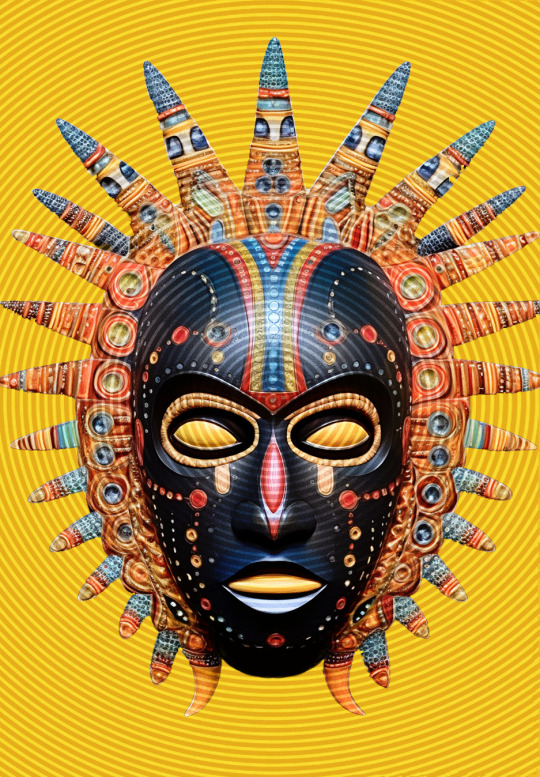
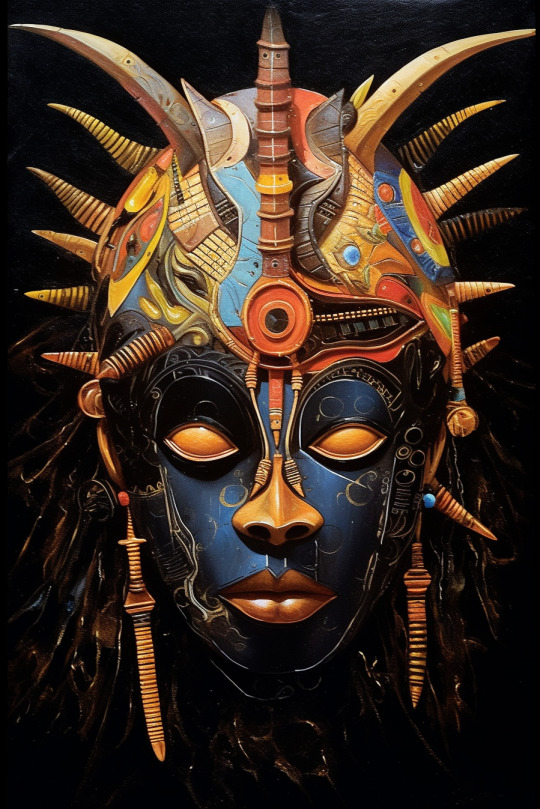
The Sacred Sun Dance ☀️
The Sun Dance is the most sacred ritual of Plains Indians, a ceremony of renewal and cleansing for the tribe and the earth. Primarily male dancers—but on rare occasions women too—perform this ritual of regeneration, healing and self-sacrifice for the good of one’s family and tribe. But, in some tribes, such as the Blackfeet, the ceremony is led by a medicine woman. It has been practiced primarily by tribes in the Upper Plains and Rocky Mountain, especially the Arapaho, Arikara, Assiniboine, Cheyenne, Crow, Gros Ventre, Hidatsa, Sioux, Plains Cree, Plains Ojibway, Omaha, Ponca, Ute, Shoshone, Kiowa, and Blackfoot tribes.
Usually the ceremony was practiced at the summer solstice, the time of longest daylight and lasts for four to eight days. Typically, the Sun Dance is a grueling ordeal, that includes a spiritual and physical test of pain and sacrifice.
34 notes
·
View notes
Text
To be American - Is to be Fragmented
I have lamented - often, and too long, the fact that I have no culture, no home to call my own.
I was raised in lands that were taken, among crimson cliffs, orange craigs, tracing carvings that predated my ancestors by generations, their meanings long lost to the cruel sands of time and desert winds. I was raised on stories of gods of foreign lands - tales of Thor, and Mjyonlir, mixing and twining with those of Zeus, Hades, Amateseru, Kokopeli, and Coyote.
I was raised fearing the Skinwalker, and was taught how a Skinwalker is vastly different from a Werewolf, and was taught Asian Ki-Gong medicine, and listening closely as the Navajo told us of their fears, showed and shared with us their dances, as friends.
I miss those days. The drum, the singing - the mesmerising spread of hoops during the eagle dance - if that's what it was called.
I saw the terror in the eyes of my first crush - a Navajo girl, as she explained that her family was moving away because they saw the shadow that laughed in the flames as their house burned to the ground, and I legitimately beleived them, felt sorry for them. I learned from them always to erase whatever you drew in the dirt, and I still do to this day.
I had an ancestor die in the Alamo, he knew Daniel Boone. Texas rangers, mountain men, the members of the LDS church who settled massive tracks of the west, who mixed and mingled with the native tribes, often in friendship, while others warred. I was told when I was younger, that there was Native american blood in me, but that what it was- from where it came - has been lost. Who even told me this>? I certainly can't remember, and don't have any proof. What tribe? What family? Where do I call home? What legends are truly mine to posess, to pass on? The Shoshoe? Ute? Paiute? One of the many tribes from Northern California?
I don't know. Do I really descend from any of them?
We learned in 2017 that my direct family line, that of my Father, hailed from clan McLeod, from Scotland, and through them, the vikings, who claimed descendance from norse gods - but are these legends mine? Are the legends of the Tuatha d'Danan now mine as well? The legends of Scottish heroes, of Scathach, who dwelt upon the Isle of Skye? The great feats of clan-cheifs proof of my line's draw to combat and war? Could I lay claim to and learn Gaelic, and not be rejected by those who still speak it as their birthright, and could I bear the seal of Clan McLeod? I can - I have a pin that marks us as descendants of the family, and we know exactly which of our ancestors branched off, changed his last name - but it still feels strange, after so long not having any connection.
My first ancestors on this land came on later voyages of the mayflower, we learned. They were here for the Revolutionary war, 1812, they were here for the civil war. We came through the younger brother- he fought for the Union, and in stories called the family slave brother, and helped to free him.
His actually older brother fought for the south - he died.
My grandfather, while in northern california, was gifted an Eagle feather. How? From Whome? Why? Am I crazy? Did this not actually happen?
I don't know.
I am an American - I was born in Ohio. I grew up at the base of and within the Rockies, and it is the tales of the miners and settlers that describe the arrival of my kin. I was raised in southern Utah, brought up on native American legends and taboos, among Hoodos, Petroglyphs, and remnants of the Ancient Pueblo, called the Anasazi still in my youth, and my mother had an entire library dedicated to the stories, the songs, the myths and taboos of many different Tribes, and I still recall the legends about the staining of the stones, of the White buffalo, and I held a healthy respect for the legends of Coyote the Trickster, of the fact that the people of this land credited him as the one who cursed those who became Bryce Canyon. Are these legends mine? Are these songs mine to tell? Can I tell people the fact that seeing the patterns of native american pottery actually puts me at ease, makes me feel at home, in ways that other things... don't? That I yearned to enter the cities of the Pueblo left behind at Mesa Verde, that they called to me, and I could not enter, could only speculate at the lives once lived there?
I don't know.
Native tribes probbably wouldn't accept me among them. I cannot claim one as my ancestors. I can't even declare with certainty I have any Native American Ancestors.
I grew up learning martial arts, a Korean Style called Tang Soo Do, passed down from my father, who learned it at great expense. I learned to love the sword, to learn many fragments of the Korean Language, and always seek to know more, and have adopted many aspects of martial arts culture. I bow reflexively in respect to others, be it a small nod of the head, or an accidental full bow in times of exhaustion. I have accidentally bowed while crossign the threshold of my home, or while entering a gymnasium, or while entering my bedroom. I shake hands with my left arm tucked under my right elbow- a habit engrained through years of shaking the hands of other martial artists in greeting, and I accept things offered to me with both hands - a custom I have learned is prevelant in Asia.
I cry when I watch the end of elemental - they have the Big Bow- what do we have here in America? In India, they have ways to show maximum respect to their fathers, to their elders, to show their gratitude, great gestures to save for those of Import. What do I have? I yearn to show this level of respect for my own parents, to share with them a gesture that is filled with such meaning, and I am left feeling that I have NOTHING save to invite them to the events which are of greatest significance. Do I make something, a masterwork weapon to gift to my father, to echo the many training weapons he made and gave to me? What could possibly convey this?
Our culture has nothing. We have to borrow from others around us.
I learned that there are Ties within our style to Shotokon, in Japan, to Shaolin Boxing, in China, and to a dozen other styles around the world. Are any of these tales and stories mine to tell? Can I truly claim legacy with the Hwa'Rang'Dan? Can I claim sincerely descendance through training, through legacy of instructor and teacher, back to the Silla Dynasty in 57 BC? My martial arts legacy is 3 steps away from Chuck Norris, and 3 steps away from Grandmaster Jae Chul Shin - does that matter?
I don't know - some will tell me yes - many will tell me no.
Lastly. I came to live in another country, to learn the legacy of Artigas, of San Martin and Belgrano - of their fight against the Spanyards, and I learned of the battle of Tucumán, and felt great pride for the fact that the Gouchos fought like demons. I came to speak Spanish, Castellano specifically, and to take to the language so well I had to take a couple months to learn english again when I returned, and months more to remember what a "Watermellon" was called. I began to feel most comfortable with an Aguayo sash around my waist, a knife tucked in the wraps, and my favorite way to keep warm in winter mornings to this day is to Don my Poncho in the colors of Salta, and remember the cable cars, the climb down the hill, the sights and crisp mornings that always greeted me, the briliant golden light of the main Plaza of Salta or Monteros during the day, or the sight of the night sky as I looked at a moon that seemed to Wax and Wane in reverse.
I am not from there- but still, to this day - Castellano leaps to my lips, and the Chacarerra brings me comfort. I'm sad I lost my hat - I actually thought I looked good in that one.
And I miss Gaseosa Secco.
oh forgotten gods of all my ancestors - Secco is fantastic, and if you are in Santiago del Estero for some reason - you need to try some.
I think, one of the defining traits of life as an american... is the hollowness. We do not really have a food to call our own. We do not really have legends beyond our founding, save those our ancestors brought with them, and shared to their kids. Many are immigrants- they have the stories of their homelands, and they claim them as theirs. People say that our legacy as Americans is that we posess all legacies- but that's not really the case. Cultures do not readily share, do not readily welcome outsiders, and we are not really part and pacel of any culture, not really. There is a void there that used to be filled with patriotism, but as despotism, fascism, curruption, and inumerable other ills cause our nation to crumble from within, as corporations dictate the whims of law, and cause those of use who are simply trying to live life to flail, to flounder, to scream and rage futily against a system too megalithic for us even to understand....
We are left with nothing.
Maybe that Is why we hold to our guns - the only stories we have left are of the revolution - stories of hunters who drove off an empire. Perhaps this is why we are so violent- for stories of violence are the only stories we can truly call our own.
I want to claim the stories of my clansmen - for I feel this claim the most direct.
But... I was not raised on those legends.
I was raised playing with my brothers, pretending Loki, Hermes, and Coyote were names for one crazy individual - I was raised reading about all these other cultures, with their names and customs, and dreaming I might see a white buffalo someday, or that I might track and kill an Elk the traditional way - I almost hunted one with a Katana directly drawn from the sheath - that action might describe this clash of cultures best. An american descended from the English, the Scottish, and who knows what else, wearing a krorean do-bohk and nearly hunting one of the most American Animals possible with a Japanese weapon, and then cursing in Spanish when I missed.
I am so deeply American it almost hurts. In the continental sense, not in the national sense. We were on this continent before the USA, and we come from and have been to countries all over these two continents.
I meet people daily from Israel, and wonder if the Geneology that ties me back to the Tribe of Ephraim lets me claim kinship with them, who come from the Tribe of Judah. I meet people from Ethiopia, and am in awe at the beauty of their language. I meet people from spain, Cambodia, the Philipenes, California, Wyoming, New York City, Mexico, China, Vietnamn, and Ukraine - and all of them are equally foreign, equally similar to myself. I teach them, and we all have legends to share - stories to pass around. I have heard legends from other cultures, and in turn have taught them the tale of Achiles.
As was said by Hugh Laurie - "America is too big to [even] know itself."
My soul wails, for it does not have a people, and I search for them constantly. I search for friends, I try to live in whatever culture remains to us- but what is that? Is it the DnD which many of us have fled to as our means of telling stories, of gathering around the fire? Is it the dying breed of the cowboy, who used to be common when I was growing up, herding their sheep and horses, fighting mountain lions in my lifetime, and hunting deer with bows and arrows? Is it our culture that we learn to make things that originally hailed from so many other cultures? Is it the Martial Arts family that I have truly come to love and cherish in a way similar- although not as critical or tight- as the ties I feel to my blood-kin?
My father hand-makes recurve bows, and fletches his own arrows, and taught us to do the same- We learn to make and repair swords, and each have affinities for swords of different legacies. Weapons hailing from different countries. We learned how to bind books, like the europeans did, and like the Maya did once upon a time, before the Conquista, and practiced writing on rice and slats of wood, inspired by the Chinese and Japanese.
I want to scream, I want to cry out and unify the threads of my identity -
But.... around what?
what can I claim to be?
I don't Know.
6 notes
·
View notes
Text
In the United States 🇺🇸 around twenty five states are of Native American origin.
Alabama- named for the Alabama or Alibamu Muskogean tribe means “clearer’s of the thickets.
Alaska- named for the Aleut word Alaxsxqua means mainland.
Arizona- named for an O’odham word Alisonak meaning “small spring”.
Arkansas- origin uncertain Alkansia south west people Alkansas.
Connecticut-named after a Mohican word Quonehtacut , means place of long tribal river.”
Dakota North/South a Dakota word meaning Friends or Allies.
Hawaii- is an original Hawaiian word meaning “homeland”.
Illinois-named after the Illinois word Illniwek meaning men.
Iowa-named for the Ioway Tribe whose name means “gray snow”.
Kansas- named for the Kansa Tribe whose name means “South Wind People “.
Idaho-not known origin but thought to be a “Gem of the Mountains “.
Indiana-presumably named for the people living along the river or natives living near western Pennsylvania.
Kentucky- origins unclear it may have been Iroquoian name Kentake” meaning the meadow land of tomorrow.
Massachusetts- named for the Algonquin word Massadchu-es et means “ great hill-small place”.
Michigan- from Chippewa word Michigama “ meaning large lake “.
Minnesota- named for the Dakota Indian word Minisota meaning “white water or mist with smoke “.
Mississippi-named for the river by the Choctaw Tribe meaning “Great Waters or Father of Waters”.
Missouri-named for the Missouri Tribe means “Dugout Canoes”.
Oklahoma- Choctaw Nation means “Land of the Red Men”.
Tennessee- Cherokee origin from the tribe living on the Tanassee or Tennese River means “Bend in the River”.
Utah- named for the Ute Tribe that lived there
Wisconsin- named for its principal river means “Wild Rushing Channel” also refers to holes in its banks for nesting birds.
Wyoming- from the Delaware or Leni-Lanape word mouth-wari-wama means “Mountains and Valleys alternated”.
7 notes
·
View notes
Note
So, another question about the history and geopolitics of things. Unless I'm wrong, aren't both the Arapaho and Ute tribes still around in small numbers? If so, how did they react to Monsters coming to the surface? I'm saying I might be wrong because, well, due to unknown factors, while you all are in the 2110s, I'm typing this all the way back in 2024, so things are definitely a bit different from your current day. As of 2024, both groups have an estimated 10,000 remaining members each, so I don't know if they would've declined or something by your time. Actually, that brings up another question I just thought of: What exactly is the population of monsterkind? I'm actually kind of curious about this.
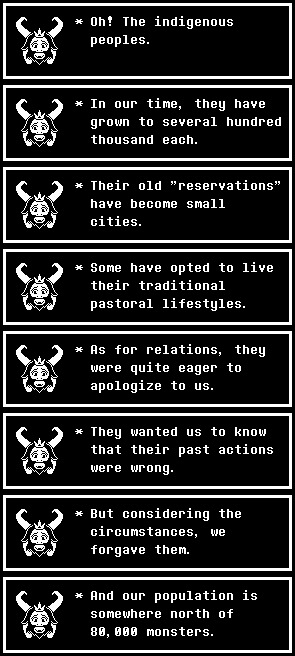
yeah... native people are interesting. i remember a band of them grazed their horses on the prairie near ebbott a month or so before i went to the mountain.
Yes. In my time, their conditions were much worse. It seems things have greatly improved for them. Though from what I've heard, they still face their share of problems.
4 notes
·
View notes
Text
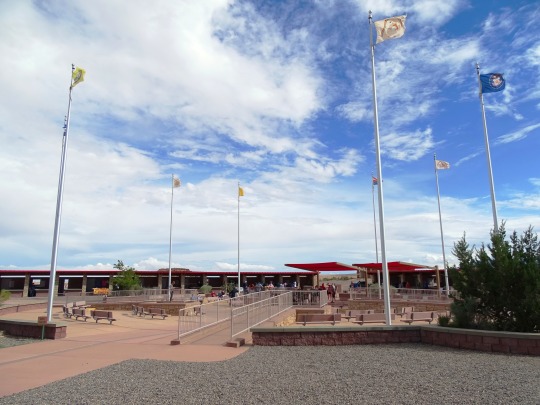


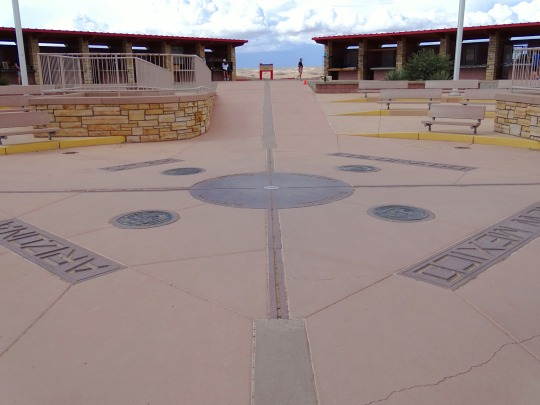

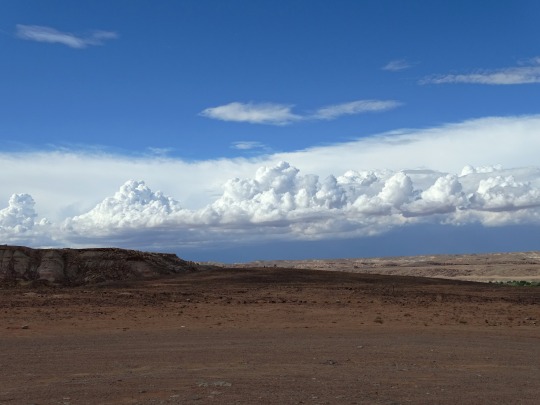
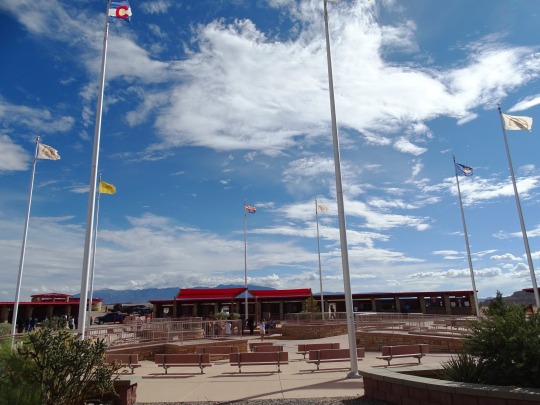

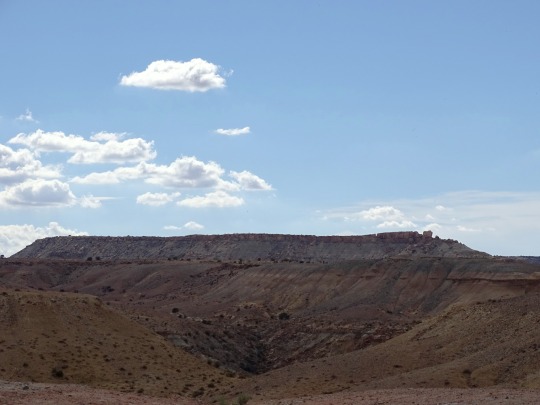
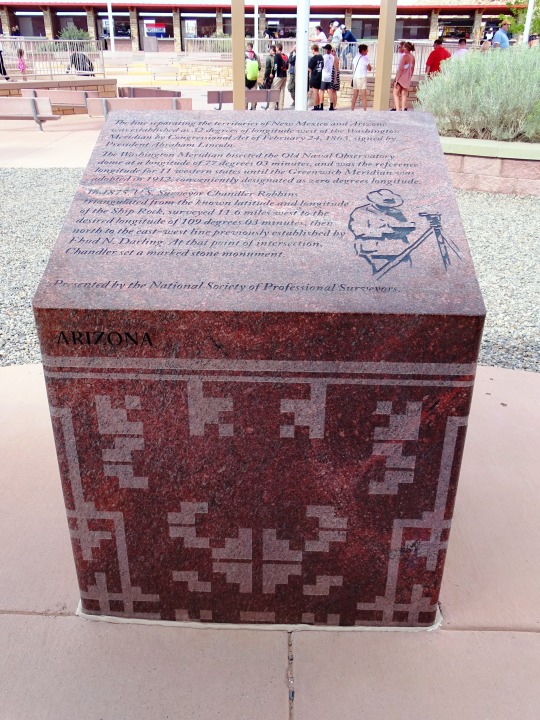
Four Corners Monument (No. 2)
The monument is maintained as a tourist attraction by the Navajo Nation Parks and Recreation Department, Four Corners Monument Navajo Tribal Park. It is an example of a political boundary that is a tourist destination in its own right. The monument consists of a granite disk embedded with a smaller bronze disk around the point, surrounded by smaller, appropriately located state seals and flags representing both the states and tribal nations of the area. Circling the point, starting from Colorado, the disk reads with two words in each state "Here meet in freedom under God four states". Around the monument, local Navajo and Ute artisans sell souvenirs and food. An admission fee is required to view and photograph the monument. The monument is a popular tourist attraction despite its remote and isolated location. As early as 1908, people traveled long distances to take pictures of family and friends at the monument in Twister-like poses, sitting on the disk, in a circle of friends or family around the disk, or for couples to kiss directly over the disk.
The monument is located on the Colorado Plateau west of U.S. Highway 160, approximately 40 miles (64 km) southwest of Cortez, Colorado. In addition to the four states, two semi-autonomous American Indian tribal governments have boundaries at the monument, the Navajo Nation and the Ute Mountain Ute Tribe Reservation, with the Ute Mountain tribal boundaries coinciding with Colorado's boundaries at the monument.
Source: Wikipedia
#Four Corners Monument#Southwestern USA#Arizona#Colorado#New Mexico#Utah#USA#travel#original photography#vacation#tourist attraction#landmark#landscape#countryside#clouds#desert#hills#summer 2022#Navajo Nation#Ute Mountain Ute Tribe Reservation#Colorado Plateau#roadside attraction#flag pole#geology
1 note
·
View note
Text
okay so heres my fan theory on what actually happened in that stream cause i dint think i can live with the way it ended
this is what wikipedia says about the etymology of the word "Utah"
The name Utah is said to derive from the name of the Ute tribe, meaning 'people of the mountains'.[19] However, no such word actually exists in the Utes' language, and the Utes refer to themselves as Noochee. The meaning of Utes as 'the mountain people' has been attributed to the neighboring Pueblo Indians,[20] as well as to the Apache word Yuttahih, which means 'one that is higher up' or 'those that are higher up'.
so my theory is:
wilbur did kill himself, yknow references to heaven being "up there" and whatever
he sailed away in that boat knowing what he was about to do, he just didnt want it to affect tommy so he lied. he said something a little crazy that wasnt true and a little dramatic in true cwilbur fashion, he still wanted people to talk about him once he was gone cause hes a whore for attention even when hes not around to hear it, and lets be honest cwilbur is the type of guy to say "all press is good press", but i digress,
wilbur killed himself, but instead of his usual limbo he somehow landed somewhere else. irl in utah. was this planned? idk, did is imagination just take over since his brain is probably preparing him for limbo again maybe it just decided letting him hallucinate an endless desert would be better than that train station.
who knows.
but hes dead and tommy is none the wiser.
cwilbur will still be causing drama, even in his death, the fact that "hes american" makes his betrayal to lmanburg even more painful, since he never cared for it in the first place, he only ever cared for the people in it.
13 notes
·
View notes
Text
Northern Ute superstitions.
I'm Northern Ute, some of these maybe what other natives do, I'm just sharing what I and my family has done since I was a kid and longer.
A thing I was always told as a child was not to look outside at night, I still don't.
Also no whistling(like no whistling of any kind, that includes using whistles) at night, because you're calling something.
Laying a knife(blade facing up) on the bedroom windowsill(in the middle) will keep spirits and stuff(little people, they take stuff or move things around) out of your bedroom.
And putting sweet grass, sage, cedar over your front door keeps your home safe.
Don't be walking around outside at night. You might see or hear something.
If you hear a woman screaming/crying outside at night it's not human. And it could also be a mountain lion/cougar or bobcat.
When you hear an owl outside you smudge yourself, and if you hear it call a name you take an eagle feather and cut it's words with the feather. Face the direction where the owl is and tell it to speak no more as you use the eagle feather to cut through the air horizontally. Owls mean death in my tribe.
Coyotes and dogs crying around all ugly isn't good, brace yourself for some spooky activity at night if your going to be up late.
Water babies haven't been heard crying on my rez but if they're cry it's pretty bad. Just don't go towards it if you hear babies crying by any water source.
Blowing bubbles in water or random water gargling calls the rain.
Screaming around and being loud while pine cone gathering will scare away the pine cones and next harvest will be slim pickings. Not good if you love pine nuts.
Don't let babies look in the mirror, don't let the rain touch babies till their first birthday.
Don't sit on the ground when pregnant or something will try to hurt the baby. Sit in a chair or on a blanket
#Native#Native American#Northern Ute#Ute#Indigenous#Ndn#anything forgotten I'll do a part 2#this is what I remember atm
4 notes
·
View notes
Text
by Sammy Herdman
MongaBay
3 October 2022
The Uinta Basin is home to a diverse set of creatures from endangered black-footed ferrets to plants that cannot be found anywhere else in the world, such as the Uinta Basin hookless cactus and Graham’s beardtongue.
But the basin also sits atop pockets of crude oil and natural gas, which are being extracted: to transport these fossil fuels to the Gulf Coast, local governments and oil companies are planning to invest up to $4.5 billion to construct a new railway through it.
Although the project has been approved, construction hasn’t begun and it’s not too late for U.S. President Biden to keep his climate pledges and stop the new railway, a new op-ed argues.
This article is a commentary. The views expressed are those of the author, not necessarily of Mongabay.
The Uinta Basin, named after the Ute Tribe, is located in Northeast Utah and Western Colorado, about 200 miles from Salt Lake City. Streams from the Uinta mountains roll through the basin into a tributary of the Colorado River – supplying 40 million people with water throughout the drought-ridden West. Plants that cannot be found anywhere else in the world, such as the Uinta Basin hookless cactus and Graham’s beardtongue, flourish in the Uinta Basin. The ecosystem also harbors endangered species such as the sage grouse and black-footed ferret.
By all accounts, the Uinta Basin is a beautiful ecological haven. Unfortunately, however, it sits atop pockets of crude oil and natural gas, which are being extracted. To transport crude oil to the Gulf Coast where it will be refined, local governments and oil companies are planning to invest $1.5 to $4.5 billion to construct a new railway through the basin.
The Uinta Basin Railway is a proposed 88-mile stretch of train tracks that will blast through mountains, reroute 443 streams, bulldoze through endangered sage grouse habitat, appropriate private property and even fragment a roadless area in the Ashley National Forest. According to the U.S. Forest Service Chief, “a railway does not constitute a road.” The railway is projected to quadruple the region’s oil extraction from 85,000 up to 350,000 barrels of oil per day – resulting in an increase in air pollution, noise pollution, habitat degradation and a greater risk of water pollution, train derailments and wildfires. The region already suffers from chronic air pollution, falling below federal standards for ozone pollution set by the Environmental Protection Agency.
By quadrupling fossil fuel extraction in the Uinta Basin, construction of the railway is projected to increase U.S. carbon emissions by 1%. Escalating climate change will bring more wildfires and more drought to the region – at a time when the Biden administration should be actively trying to reduce carbon emissions to prevent further climate change-fueled catastrophes.
Uinta Basin is freckled with small cities and towns such as Vernal, Duchesne and Jensen. The region’s economic history can be summarized as a series of boom and bust cycles due to its reliance on fossil fuels. The whims of the Organization of the Petroleum Exporting Countries (OPEC) and the fluctuations of oil prices determine the quality of life for many people in the Uinta Basin. These fluctuations often send communities into periods of growth and stretches of economic depression that threaten small business and family security.
Proponents of the Uinta Basin Railway claim that its construction will diversify the economy of the region by connecting it to the global market. However, there is little evidence that the railway will be used to transport anything but oil to or from the region, especially because at least 130,000 barrels of oil per day will have to be transported to recoup the cost of construction. This will only cause harm and exacerbate boom and bust cycles.
1 note
·
View note
Text
0 notes
Text
A Native American tribe is building a $1B solar farm in Colorado
0 notes